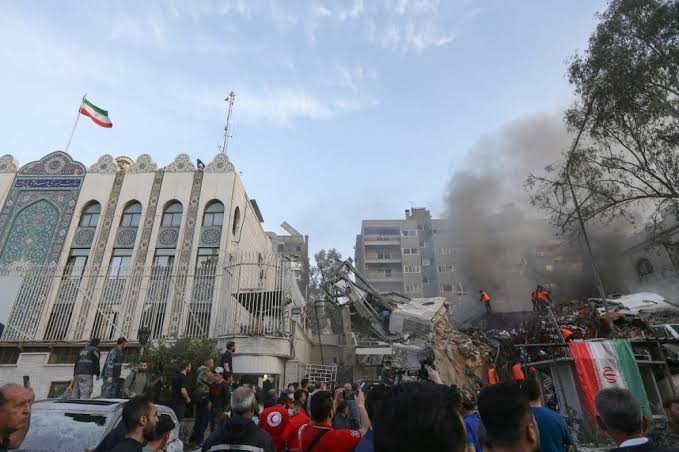
Preventing Regional Escalation in The Middle Eastern Conflict
The recent intensification of hostilities between Israel and Iran has underscored the urgent need for coordinated international intervention to prevent this crisis from evolving into a broader regional conflict. Following an Iranian ballistic missile strike on Israeli soil on 1 October, Israel launched one of its largest air campaigns to date against Iranian targets, focusing on IRGC facilities and missile production sites. This escalation, compounded by ongoing clashes involving Hezbollah in Lebanon and airstrikes in Gaza, illustrates the fragility of regional stability and the potential for widespread escalation. The intricate alliances and rivalries that define the Middle East now pose challenges to global actors committed to containing this volatile situation.
The Context of Israeli-Iranian Hostilities
Hostilities flared with a major missile assault on Israel, widely attributed to Iranian forces. Israel’s subsequent strikes on Iranian military installations marked a significant shift from its prior restraint, indicating a possible change in its strategy towards Iran. Iran now faces a critical decision: to either absorb the strikes and risk further aggression or to retaliate, which could provoke broader conflict. This situation follows earlier events in April when Israeli strikes in Damascus killed seven senior IRGC officials, including prominent commanders like Mohammad Reza Zahedi. Iranian Supreme Leader Ali Khamenei publicly condemned these attacks, framing them as provocations by external actors that threaten regional peace.
Historical Precedents: The Value of Global Cooperation in Conflict Resolution
Historically, global powers have mediated Middle Eastern conflicts using diplomacy, sanctions, and negotiations. The 2015 Iran nuclear agreement, for example, was brokered by the P5+1 and temporarily curtailed Iran’s nuclear ambitions, illustrating the potential of international cooperation to avert escalation. Other efforts, such as the 1979 Camp David Accords facilitated by the United States, demonstrate how structured, goal-oriented diplomacy can foster long-term peace. Today, however, renewed violence after Hamas’s attacks in October 2023 and ongoing instability in Lebanon challenge the efficacy of similar diplomatic measures.
The Role of the United States and Global Cooperation
As the situation unfolded, President Joe Biden expressed hope, emphasising Israel’s right to self-defence. Biden confirmed that U.S. military assets, including two Navy destroyers, were repositioned to the Mediterranean to support Israeli air defences. U.S. Defence Secretary Lloyd Austin reiterated “ironclad” support for Israel while urging restraint to avoid escalation. The G7 nations, including the United Kingdom and France, have issued joint statements condemning Iran’s actions and calling for diplomacy. Biden has engaged directly with Israeli Prime Minister Netanyahu, advocating for a diplomatic approach to prevent a wider conflict.
Hezbollah’s Involvement and Regional Tensions
Israeli airstrikes targeting Hezbollah sites in Lebanon and the deployment of troops along the northern border highlight preparations for a possible prolonged conflict. Hezbollah, a long-standing ally of Iran, often acts as a proxy force in responding to Israeli actions on Iran’s behalf. The exchanges between Hezbollah and Israeli forces introduce an additional flashpoint in the region. If unchecked, this situation risks drawing Lebanon deeper into the hostilities, escalating tensions across multiple fronts and amplifying the need for global intervention to prevent a broader conflagration.
Establishing a Cooperative Framework for Crisis Management
Ongoing tensions could drive the establishment of a more formal crisis management framework in the Middle East, potentially mediated by the United Nations or regional security councils. NATO’s cooperative security model offers a possible example, although adapted for the unique dynamics of the Middle East. NATO’s approach, centred on collective security and diplomatic channels, could inspire a framework suited to this region, where conflicts often cross national borders.
Creating a multilateral security dialogue among regional stakeholders could serve as a preventive mechanism, enabling real-time communication and coordination to manage future tensions. Although complex, such initiatives could help contain incidents before they escalate into widespread conflict, as seen in the current Israel-Iran hostilities.
The Path Forward: Renewed Diplomatic Engagement
Effective resolution of this crisis requires a renewed commitment to diplomatic channels. The Biden administration could lead by encouraging diplomatic solutions while reassuring allies of continued support. Additionally, other major players, including the European Union, Russia, and China, could use their influence to urge Iran to avoid full-scale retaliation. Cooperation from Arab League nations, who have a vested interest in regional stability, could further bolster international efforts towards de-escalation, fostering a unified global response.
Conclusion: A Critical Moment for Global Cooperation
The intensifying conflict between Israel and Iran highlights a critical juncture in Middle Eastern relations, where global cooperation must play a decisive role in containing escalation. By leveraging historical diplomatic successes, strengthening economic and military alliances, and reinforcing diplomatic networks, the international community has an opportunity to steer the region away from the brink of war. Preventing further escalation will demand a concerted, multilateral approach, acknowledging the intricate web of alliances and rivalries in the Middle East and underscoring the enduring need for cooperative action to secure regional peace and stability.
Dr Brian Reuben is the Executive Chairman of the Sixteenth Council and Founder of the Africa Economic Summit.



